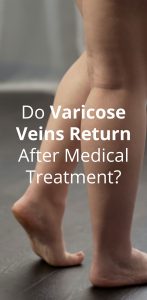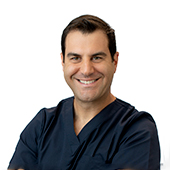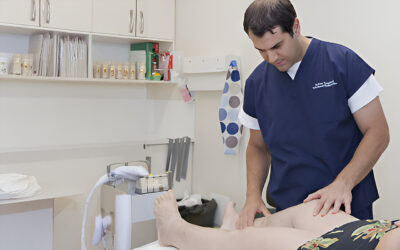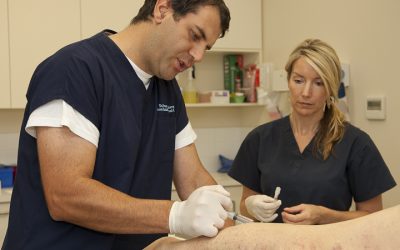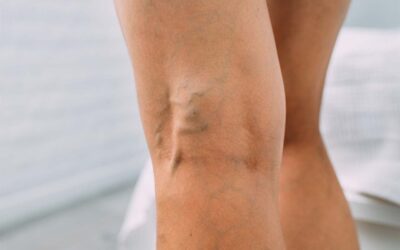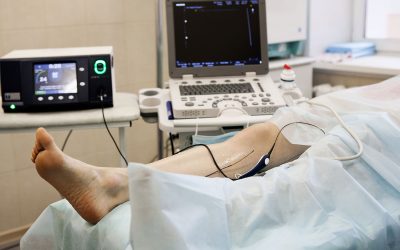For thousands of Australians suffering from the symptoms of varicose veins, the consideration to undergo medical treatment is often at the forefront of their minds. There are many state-of-the-art procedures available to treat varicose veins, including endovenous laser ablation (EVLA), ultrasound guided sclerotherapy, VenaSeal, and radiofrequency ablation. Most of these treatments can be completed within the hour on a walk-in, walk-out basis – meaning the idea of having to undergo a surgical procedure to treat your varicose veins is not necessarily the case.
However, the questions we need to ask are “If you decide to undergo these types of treatments, is it a permanent fix for your varicose veins? Will varicose veins come back?” To answer this, we need to look at the treatments and their effects in a little more detail.
Undergoing a treatment of VenaSeal, for example, works by directly sealing off the vein; the result of this is that the vein then hardens and becomes absorbed by your body – permanently removing the vein.
So, the veins that are directly treated will not come back. However, it is important to remember that although old veins are removed permanently it is possible for new veins to develop and then appear with time.
When Varicose Veins Return
There are direct causes we need to consider if your varicose veins have returned after undergoing a treatment designed to permanently fix the problem areas. The causes of post-treatment recurrence of varicose veins can be divided into two broad groups; patient-related factors and doctor/treatment-related factors.
1. Patient-Related Factors
Your family history and other hereditary factors can play a part in the recurrence of varicose veins after certain treatments. What causes your varicose veins? Though the actual causes of varicose and spider veins are not completely known, a strong correlation has been seen between patients and their family history. This common link suggests that sufferers of reoccurring varicose veins have inherited veins that are more likely to deteriorate and further develop after treatment.
A few more factors that could cause your varicose veins include:
- Up to 30% of people are affected by varicose veins – both men and women. But they may present in women at an earlier age than their male counterparts.
- Hormone fluctuation: especially common in women going through puberty, pregnancy, and menopause
- Obesity
- Lack of mobility
- Occupations requiring years of standing up
- Previous suffering of venous thrombosis or another type of leg injury
For patients who fall into any of these categories and are suffering from reoccurring varicose veins as a result, a long-term management plan may be required to monitor further abnormal veins. This may involve regular ultrasound and clinical examinations as well as scheduled treatments to help control the problem and get control over the symptoms.
Remember – having varicose veins isn’t the same as having a short-term ailment like a virus or infection; a long-term management plan needs to be instituted to ensure that the condition remains stable.
2. Doctor/Treatment-Related Factors
Unfortunately, like anything to do with our body, an incorrect diagnosis of how to treat your varicose veins can lead to incorrect treatment. The result of this is the reappearance of new veins (or continued development of the existing ones). Inadequate treatment of a vein problem can lead to damage to surrounding veins, causing these veins to then become visible and widespread.
When it comes to your veins, consult with the experts before undergoing any further procedures. See a phlebologist, someone who can expertly diagnose and treat the many forms of venous disease.
Another important factor that can lead to the apparent development of more veins is traditional surgery. Post-surgical recurrence is a well-understood phenomenon and can be carefully dealt with utilising a combination of laser, glue, and sclerotherapy treatments. Post-surgical recurrent veins can be dealt with only by the most experienced and highly trained phlebologists and involves extremely detailed ultrasound diagnosis with the most advanced ultrasound units, impeccable ultrasound guided skills, very careful post-operative follow-up, and extreme attention to detail.
For example, following high ligation and stripping of the great saphenous vein, patients will quite frequently develop neovascularisation (new blood vessel growth) in and around the groin area that will most often involve the lymph node venous network and pelvic varicose veins. Treatment of these veins will require the following:
- Accurate ultrasound scanning to diagnose and chart the damaged veins.
- Careful ultrasound guided sclerotherapy, ultrasound guided medical adhesive closure and in some cases, endovenous laser ablation.
- Vulval veins will require excellent and precise ultrasound guided injection skills to ensure accurate placement of the sclerosant solution to help permanently seal these veins off.
- Meticulous post treatment follow up to ensure permanent closure of the treated veins and to check for residual or recurrent veins.
- The treating phlebologist needs to possess excellent hand-eye coordination skills and visual skills along with an attention to detail attitude to ensure the highest standard of medical treatment.
Key takeaways
- If varicose veins return after treatment, it is usually a result of a strong family history of venous disease, or incorrect diagnosis or management by the treating practitioner.
- The very latest in the treatment of varicose veins available from our phlebologist include endovenous laser ablation (EVLA), ultrasound guided sclerotherapy, VenaSeal (medical adhesive), and radiofrequency ablation.
